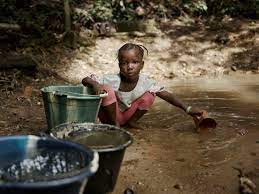…Perennial Shortage Unsettles Residents
Residents of the Federal Capital Territory (FCT), Abuja, are facing a severe water scarcity crisis, leaving them to struggle for access to this basic necessity. In this special report, Juliet Jacob sheds light into the harrowing experiences of FCT residents desperately searching for clean water for drinking and domestic use.
Water Scarcity Affect Affects 3.8 Million Residents
A severe water scarcity crisis is gripping the Federal Capital Territory (FCT) of Nigeria, leaving over 3.8 million residents struggling to access this basic necessity.
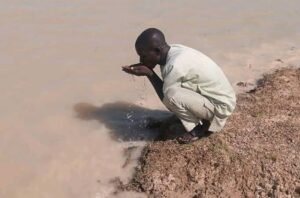
The shortage has hit communities such as Bwari, Karo, Ushafa, Dutse, Lugbe, and Apo particularly hard, forcing residents to rely on boreholes, water vendors, and sometimes unsafe water sources.

The water scarcity crisis in Abuja, Nigeria’s capital city, raises critical concerns about environmental sustainability and human rights.
Despite being the seat of the federal government, Abuja’s residents are denied access to clean water, a fundamental right. The situation underscores the need for urgent attention and action from the authorities to address this pressing issue and ensure that residents have access to safe and clean water.
Devastating Water Crisis
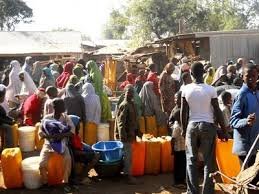
The country is grappling with a severe clean water crisis, with over 70 million people lacking access to safe drinking water, according to UNICEF.
The situation is exacerbated by inadequate sanitation facilities, with 110 million people living without proper toilets.
This has led to dire consequences, including the deaths of approximately 150,000 children under five from diarrhea-related diseases every year.
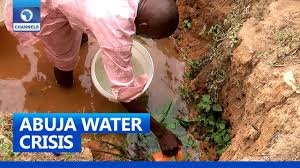
Climate change has worsened the crisis, with unpredictable rainfall patterns and flooding contaminating already scarce water supplies.
The situation threatens Nigeria’s progress toward achieving the United Nations Sustainable Development Goal Six (SDG 6), which aims to ensure universal access to clean water and sanitation by 2030.
At the current pace, Nigeria risks falling 16 years behind, perpetuating cycles of poverty, disease, and inequality.
Struggles of the FCT Water Board

The water scarcity crisis in Abuja, Nigeria’s capital city, is a stark reminder of the country’s struggling infrastructure and inadequate governance.
The FCT Water Board, responsible for providing potable water, faces a myriad of challenges that have left residents without access to this basic necessity.
At the heart of the crisis lies the aging infrastructure, with pipes over 30 years old prone to frequent bursts and leaks.
This is compounded by inadequate funding, which hampers expansion and maintenance efforts. The rapid urbanization of Abuja has also outpaced the existing water systems, exacerbating the shortage.
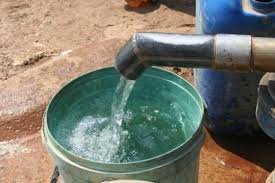
Furthermore, illegal connections and environmental pollution have reduced water pressure and contaminated supplies, respectively.
These obstacles have forced many residents to rely on private boreholes or expensive water vendors, perpetuating a cycle of inequality and poverty.
The Abuja water crisis is a ticking time bomb, with far-reaching consequences for public health, economic development, and social stability.
To address this crisis, some residents who spoke with Africa Health Report (AHR) said the government must prioritize investments in water infrastructure, improve funding for the FCT Water Board, and implement effective policies to regulate water usage and protect water sources.
“The Abuja water crisis serves as a wake-up call for the Nigerian government to address the country’s broader infrastructure challenges and ensure that citizens have access to basic necessities like clean water.”, Mr Umar Abubakar, a civil servant said.
Public Health Time Bomb
The severe water scarcity crisis in Abuja, Nigeria’s capital city, has far-reaching and devastating health consequences.
The reliance on poorly maintained boreholes has exposed communities to a plethora of waterborne diseases, including typhoid fever, cholera, diarrhea, and hepatitis A and E.
The most vulnerable members of society, children and the elderly, bear the brunt of this crisis. The lack of access to clean water and poor sanitation facilities has created a perfect storm for the spread of diseases.
The consequences are dire, with the potential for outbreaks and epidemics that could overwhelm the city’s healthcare system.
Furthermore, the water scarcity crisis has a disproportionate impact on young girls, particularly during menstruation.
Poor sanitation and limited access to clean water in schools exacerbate the challenges faced by these girls, compromising their health, dignity, and education.
The Abuja water scarcity crisis is a stark reminder of the need for urgent investment in water infrastructure, sanitation facilities, and public health initiatives.
Ultimately, the health consequences of Abuja’s water scarcity crisis are a ticking time bomb, threatening to unleash a wave of waterborne diseases and public health crises.
Experts say it is imperative that the government takes immediate action to address this crisis and ensure that citizens have access to clean water, sanitation, and healthcare.
Abuja’s Borehole Boom: A Double-Edged Sword
The proliferation of boreholes in Abuja, Nigeria’s capital city, has brought both short-term relief and long-term environmental and socioeconomic concerns.
While boreholes have provided a temporary solution to the city’s water scarcity crisis, they pose significant risks to the environment, public health, and the economy.
Environmentally, the over-reliance on boreholes threatens to deplete groundwater resources, compromising future water availability.
The close proximity of boreholes in urban areas also increases the risk of cross-contamination, further exacerbating the city’s water woes.
Moreover, excessive drilling has weakened soil stability, raising concerns about subsidence and structural damage.
The socioeconomic consequences of Abuja’s borehole boom are equally alarming. Businesses reliant on water, such as car washes and restaurants, face operational challenges, threatening livelihoods and economic stability.
Furthermore, water-related illnesses and the burden of household chores keep children, particularly girls, out of school, perpetuating cycles of poverty and inequality.
It has been suggested by experts that the government must take a holistic approach to addressing Abuja’s water scarcity crisis, balancing short-term needs with long-term sustainability.
This includes investing in modern water infrastructure, promoting water conservation practices, and implementing regulations to prevent environmental degradation and socioeconomic harm.
By doing so, according to experts, the government can ensure that Abuja’s residents have access to clean, safe, and sustainable water, while also protecting the environment and promoting economic development.
FCT Residents Cry Out Over Water Scarcity
As the water scarcity crisis in the Federal Capital Territory (FCT) continues to wreak havoc on the lives of residents, the lamentations have reached an alarming level.
For Mrs. Benson, a resident of Dutse Alhaji in Bwari, the struggle is relentless. “We rely on mai ruwa (water vendors) for our daily water needs,” she lamented.
“A truckload of water used to cost ₦300, but now it sells for ₦600. Even when the Usumandam water supply works, the flow is painfully slow, and outages can last a week.”
Mrs. Benson’s story is a stark illustration of the day-to-day hardships faced by FCT residents.
The coping mechanisms employed by residents, such as relying on expensive water vendors, are a testament to the government’s failure to provide a basic necessity like water.
As the water scarcity crisis continues to bite, residents like Mrs. Benson are left to wonder when they will have access to clean, affordable, and reliable water.
Multi-Faceted Solution Needed
As the water scarcity crisis continues to plague the Federal Capital Territory (FCT), experts are calling for a comprehensive approach to address the issue.
According to stakeholders, a multi-pronged strategy is necessary to ensure equitable access to clean water for all residents.
To start, policy and funding reform are crucial. Governments must prioritize water infrastructure in their budgets, allocating sufficient funds to maintain and upgrade existing systems.
Additionally, public-private partnerships can play a vital role in innovating solutions for equitable distribution.
By collaborating with private sector stakeholders, the government can leverage expertise and resources to improve water access.
Moreover, environmental regulation is essential to prevent degradation. The drilling of boreholes, for instance, requires strict oversight to prevent contamination and depletion of groundwater resources.
Community awareness and education campaigns can also promote water conservation and safe practices, empowering residents to take ownership of their water usage.
Finally, emergency preparedness is critical. Fire services must ensure adequate water access during crises, such as fires or floods.
By addressing these key areas, the FCT can begin to alleviate its water scarcity crisis and ensure a more sustainable future for its residents.
Call to Action
As the water scarcity crisis continues to grip Nigeria’s capital, it is clear that urgent action is needed to address this humanitarian crisis.
The government, private sector, and international partners must come together to ensure that every resident of the FCT has access to clean water, a fundamental human right.
The stakeholders all agree that the time for action is now, not just for the people of Abuja and Nigeria, but for the future generations who will inherit the consequences of the government’s inaction.

